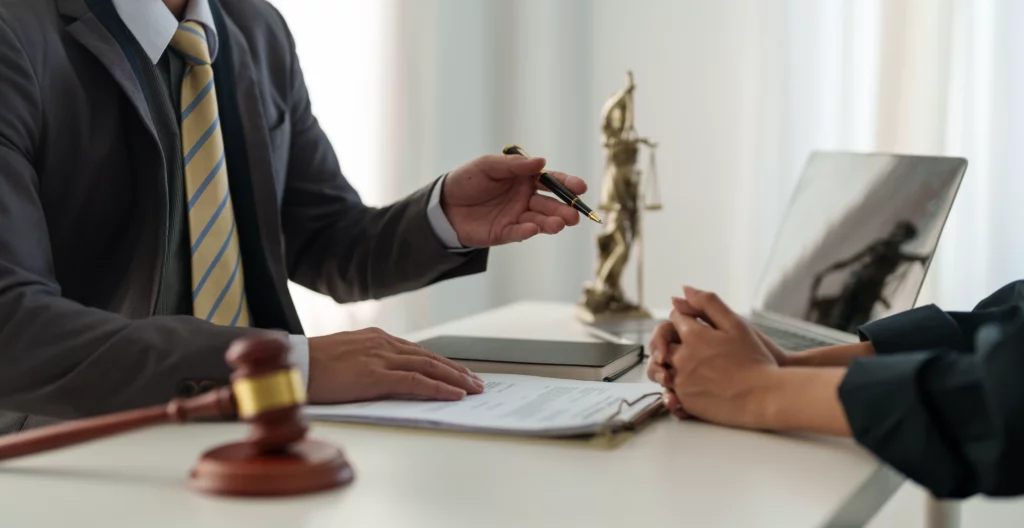Criminal Defense


Criminal Defense Attorney in Los Angeles
All it takes is one mistake, one accusation, and suddenly, your entire future is at stake. In California, a criminal charge can mean years behind bars, steep fines, and a ruined reputation. It is not the time to gamble—it’s the time to act decisively and secure the strongest defense possible. If you or a loved one were arrested, you need a Los Angeles criminal defense attorney who knows how to fight back.
At Esfandi Law Group, we don’t just handle cases—we protect people. Seppi Esfandi, a UCLA School of Law graduate with over 23 years of experience, has successfully defended thousands of clients. He has achieved dismissals, reduced charges, and acquittals in both state and federal courts.
The time to act is now. Contact Esfandi Law Group today for a confidential consultation.
Let’s Get Your Criminal Charges Reduced or Dropped
We have a team of experienced Los Angeles Criminal Defense Attorneys who are dedicated to providing the best possible defense for our clients.
In 2010 he was selected as one of the 70 attorneys to hold the distinction of “Certified Specialist“.
If you’ve recently been accused of a crime, it’s imperative to hire a Los Angeles criminal defense attorney with experience.

The earlier you call, the greater your chances are of winning the case. 310-274-6529
Why Does Choosing the Right Los Angeles Criminal Defense Attorney Matter?
Not all attorneys have what it takes to handle high-stakes criminal cases. A dedicated Los Angeles criminal defense attorney provides a strategic and aggressive defense, ensuring you don’t become just another conviction.
Here’s what the right lawyer brings to your case:
- Deep legal knowledge. A skilled attorney stays ahead of evolving laws and legal precedents to ensure the best defense strategies for your case.
- Courtroom experience. An experienced lawyer understands trial procedures, cross-examinations, and how to dismantle weak prosecutions during motion hearings and trials.
- Negotiation skills. An attorney with strong negotiation abilities can secure plea deals, reduced charges, and even case dismissals. They know how to use prosecutorial weaknesses to your advantage.
- Personalized defense strategies. Every case is unique. A strong defense lawyer will craft a tailored approach based on the specific circumstances and evidence of your case.
In Los Angeles, law enforcement and prosecutors aggressively pursue convictions. Your legal representation could be the difference between freedom and years of hardship. That’s why selecting an experienced criminal defense attorney is one of the most crucial decisions you can make. A weak defense can mean devastating consequences. A strong defense strategy can mean the difference between walking free and spending years behind bars.
Make the right choice—protect your future with help from the experienced legal team at Esfandi Law Group.


What Types of Cases Does Our Los Angeles Criminal Defense Lawyer Handle?
Our firm provides aggressive defense in a wide range of criminal cases. No matter what charge you’re facing, we have the experience and skill to defend you effectively.
Serious Felony Charges
Felony charges carry severe consequences, but we fight to secure the best possible outcome. Our firm defends against:
- Murder and manslaughter—we strategize self-defense, misidentification, wrongful accusation, and other defenses;
- Assault and battery—we challenge false allegations and weak evidence; and
- Weapons and gun charges—we fight unconstitutional searches and rights violations.
Felony convictions can permanently alter your life. They can lead to years or even life in prison. We aggressively fight to reduce or dismiss felony charges, ensuring your future remains intact. The earlier you bring in a defense attorney, the better your chances of building a strong case.
Drug and Alcohol-Related Crimes
California prosecutes drug and alcohol-related offenses aggressively. Our firm defends against:
- DUI and DWI—we challenge chemical test results and illegal traffic stops;
- Drug possession and trafficking—we expose procedural violations and weak evidence; and
- Federal drug charges—we defend against severe federal penalties and mandatory minimum sentences.
Drug-related offenses can carry long-term consequences, including incarceration, fines, and loss of employment opportunities. Many drug cases involve unlawful searches. If law enforcement violated your rights, we will fight to get your charges dismissed.
White Collar and Financial Crimes
Financial crimes often involve lengthy investigations and complex evidence. We handle cases involving:
- Fraud and embezzlement—we defend professionals and business owners against unjust claims and severe penalties;
- Identity theft and cyber crimes—we fight digital evidence and improper investigative techniques; and
- Bribery and public corruption—we challenge government overreach and unconstitutional prosecution tactics.
White-collar crimes often come with severe financial and reputational consequences. We develop strategic defenses to challenge weak evidence and mitigate the impact on your career and personal life. A conviction could mean financial ruin—so let us protect your livelihood.
Sex Crimes and Special Offenses
Sex crime allegations can destroy reputations and lives. Our firm aggressively defends clients against:
- Sexual assault and misconduct—we expose false claims and unreliable evidence;
- Juvenile crimes—we advocate for young individuals to protect their futures; and
- Domestic violence—we challenge fabricated accusations and misleading testimony.
We also handle cases involving probation violations, kidnapping, obstruction of justice, hit and run, terroristic threats, harassment, and illegal search and seizure. These charges demand experienced representation, as the penalties can be severe and long-lasting.
If you or a loved one are facing criminal charges, don’t wait until it’s too late. A swift and strategic legal response can be the key to your freedom.
Why Should I Trust Esfandi Law Group As My Los Angeles Criminal Defense Law Firm?
California Penal Code §243(e)(1) is also a domestic violence offense, but is considered to be a less serious offense. The difference is that, unlike corporeal injury or cohabitant a
Choosing a Los Angeles criminal defense law firm is one of the most important decisions you will ever make. Here are just a few great things Esfandi Law Group is known for:
- Almost a quarter of a century of criminal defense experience. We’ve tirelessly defended clients against all levels of charges for over 23 years.
- Insider knowledge of the justice system. Seppi Esfandi’s former deputy public defender background means he’s familiar with state and prosecutorial tactics.
- Proven track record of success. We’ve led our clients to successful outcomes and enjoyed a multitude of victories in both state and federal courts.
- Dedication to the Los Angeles Hispanic community. We offer bilingual legal representation.
- Recognition as one of the top criminal defense law firms. Clients and professionals in the field respect Esfandi Law Group for its aggressive and strategic approach.
At Esfandi Law Group, we believe that everyone deserves a strong defense, no matter the charges they face. Our firm has successfully defended thousands of clients, securing dismissals, reduced charges, and not-guilty verdicts.
If you’re facing criminal charges, you need an attorney who will fight tirelessly to protect your rights. Don’t settle for less. A dedicated attorney can mean the difference between a future of freedom and one defined by a criminal record.
buse, domestic battery under California Penal Code §243(e)(1) has no requirement that the victim actually suffered any injury.
Frequently Asked Questions
What Should I Do If I Am Arrested?
Remain silent and request a lawyer immediately. Politely but firmly decline to answer any questions until your attorney is present.
Can a Criminal Defense Attorney Get My Charges Dropped?
While no one can guarantee an outcome—our experienced lawyers can challenge evidence, negotiate with prosecutors, and identify legal weaknesses that may result in dropped or reduced charges.
How Much Does a Criminal Defense Lawyer Cost?
The cost varies depending on case complexity. Many attorneys offer consultations to discuss pricing and payment options. Contact us today for a consultation, and let us explain our process.
Will My Case Go to Trial?
Not all cases go to trial. Many are resolved through plea bargains or case dismissals. We can determine the best strategy for your situation.
What Are My Rights After an Arrest?
You have several rights, including the right to remain silent, the right to an attorney, and the right to avoid self-incrimination. Do not waive these rights.
How Long Does a Criminal Case Take?
The length of a criminal case depends on various factors, including the severity of charges, court schedules, and legal motions that come before the court. Some cases resolve within months, while others may take over a year.
What Should I Bring to My First Consultation with a Los Angeles Criminal Justice Attorney?
Bring any documents related to your case, including police reports, court notices, and bail information. The more details you provide, the better we can assess your defense strategy.
What Happens If I Violate Probation?
Probation violations can result in additional penalties, including jail time. We can help present mitigating circumstances to avoid harsh consequences.
Can I Refuse a Police Search of My Home or Vehicle?
Yes, in most situations, you have the right to refuse a search unless the police have a valid warrant or probable cause. If law enforcement conducts an unlawful search, we can challenge the evidence in court.
How Does Bail Work in California?
Bail is a financial guarantee that allows you to be released from custody while awaiting trial. A judge determines the amount based on factors like the severity of the crime and your flight risk. We can help request bail reductions or alternative release options.
What Should I Do If I Have an Outstanding Warrant?
If you have an outstanding warrant, contact a Los Angeles criminal defense attorney immediately. We can help you address the warrant properly and potentially negotiate a resolution before an arrest occurs.
Take Action Now. Contact a Los Angeles Criminal Justice Attorney, Seppi Esfandi, Today
Every second counts when facing criminal charges. The sooner you hire an experienced criminal defense lawyer, the better your chances of securing a positive outcome. Don’t wait until it’s too late—taking action now can make all the difference in your case outcome. The legal system is complex, but with a skilled attorney by your side, you gain the advantage of experience, strategy, and an unwavering dedication to protecting your rights.
At Esfandi Law Group, we fight aggressively to protect our clients’ rights and freedom. We are prepared to defend you whether you’re under investigation or facing charges. Reach out and take the first step toward protecting your future. Call us now for a confidential consultation. Your best defense starts today.


